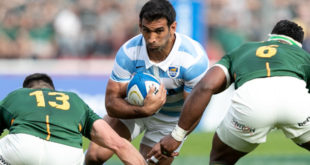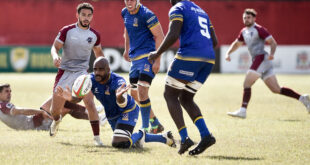The rebranding of the IRB to become World Rugby is an important part of rugby changing its image from being a sport played in certain countries to being one of global importance.
Founded in 1886 the International Rugby Football Board was the body created to act for the sport’s affairs in an international context. The organization evolved and established the Rugby World Cup which was first played in 1987 and is now three months away from the eighth edition of the global event.
Since its inception the Rugby World Cup has been modified from a sixteen team to a twenty team format and the sport has become professional. Changes also saw the name being shortened to the International Rugby Board (IRB) in 1998 which in 2014 was rebranded to be known as World Rugby.
At the helm of the change was CEO Brett Gosper who believes that the name change is about far more than serving existing markets. Gosper insists that “we also want to gather in new audiences around the world from outside, let’s say, the ‘church of rugby. World Rugby helps us do that.”
The centre piece of Rugby World Cup 2015 will be Twickenham, a venue known in Argentina as the cathedral. As the home of the RFU and the sole venue in which England hosts test match rugby it is acknowledged as being holy ground in rugby terms. Former Pumas captain and World Rugby Hall of Famer, Agustín Pichot, said words to this effect upon defeating England at the venue in 2006.
Twickenham is to host ten or 20.83% of the tournament’s forty-eight matches and will be supported by two other London venues with Wembley Stadium hosting two and the Olympic Stadium five matches. The English capital will, thus, host a staggering seventeen matches meaning 35.41% of all matches will be played in the city.
London’s stadiums are to be joined by venues from nine other English cities in addition to the Millennium Stadium in Wales. The home of Welsh rugby will host eight matches, double the number of any English stadium outside of the capital. It is to host pool matches involving nine of the twenty competing nations and will be doing so despite having hosted matches in Rugby World Cups 1991, 1999 and 2007.
Rugby World Cup 2015 is to be Wales’ fourth opportunity and it is to be England’s third. Every eight years the World Cup has had matches in Wales and, indeed, in the U.K. In combination with the words of Gosper a return to Wales must surely be absolutely out the question as should be a World Cup in the Home Unions (England, Ireland, Scotland and Wales) in 2023.
New audiences outside of the ‘church of rugby’ will need to be acquired to fulfill the mission laid out by Gosper of World Rugby. England and Wales hosting in 2015 was voted in ahead of a country never to have hosted a World Cup match, Italy. Similarly, New Zealand won the hosting rights to Rugby World Cup 2011 ahead of Japan, a country who had never hosted.
South Africa was unable to win the backing for any of the three tournaments despite bidding on all occasions. Speculation from some nonetheless implies that with Japan hosting in 2019 that the host nation of 2023 will be a previous host in an established market, that being South Africa or Ireland. It would, in other words, be the contrary of what Gosper’s organization is proporting.
2023, quite simply, cannot take place in a country which has hosting experience unless no new countries express interest. World Rugby recently confirmed that both South Africa and Japan were officially going to bid as were previous hosts Australia and France with the USA and Italy both being interested in having a first ever opportunity at hosting.
Argentina has been interested in hosting and I had personally made efforts to encourage the possibility on the web and in print from 2010 until this year. Indeed Argentina is the only Semi Finalist in Rugby World Cup history to not have hosted a Rugby World Cup match. It will, however not be bidding to host the World Cup in 2023. Instead the UAR is to back South Africa as will Australia who is to not go ahead with bidding.
A World Cup in Argentina will therefore have to wait and it is similarly likely that the prospective USA bid will not go ahead in 2023 but, instead, be in 2027 at the earliest. Both Argentina and the USA continue to undergo radical changes with moves to have professionalism in the former complete and in the later well underway.
Their efforts have resulted in unprecedented commercial successes and together with others, they seek to establish the Americas Six Nations which is planned to begin in February 2016. As the last region to be allocated a Rugby World Cup the mission of World Rugby ties in perfectly with allocating World Cups in 2027 and 2031 to the likes of Argentina and the USA.
It does not stop there however as Canada is another country of significant potential to the sport of rugby. So much so that it looms as an additional option which will gain added attention with BMO Field’s continual ability to attract strong crowds and BC Place now being a Rugby Sevens venue.
The three countries are all extremely important components of expanding rugby outside of the church. Their strong relationships past and present bodes well for the future of rugby in the region and beyond to offer a contrasting future of Rugby World Cup hosting to that of the first twenty-four years.
 Americas Rugby News Rugby news from across the Americas!
Americas Rugby News Rugby news from across the Americas!




